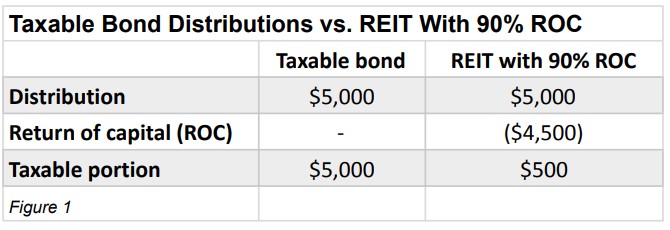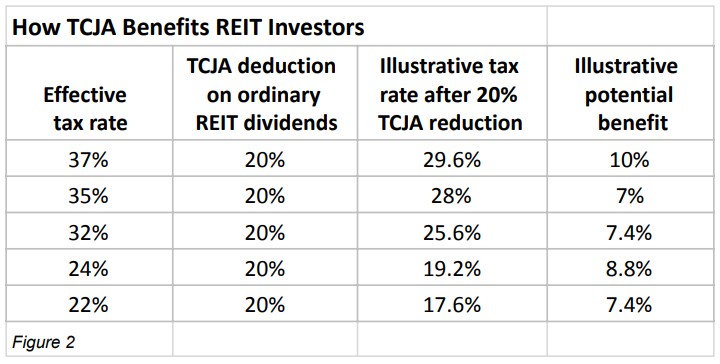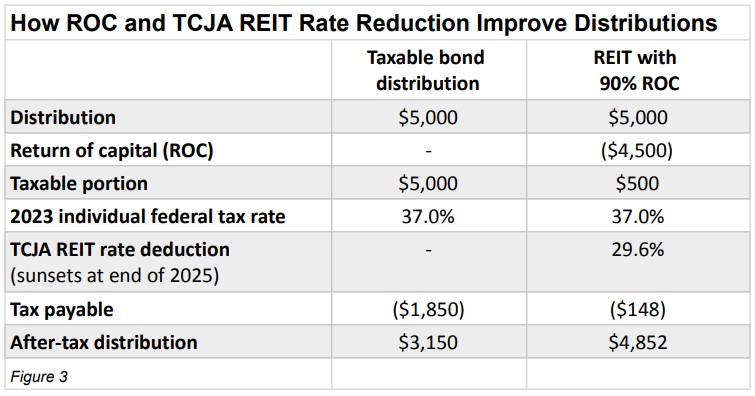How Two Tax Laws Make REITs More Tax-Friendly
Taking advantage of the return of capital (ROC) and Tax Cuts and Jobs Act rate reductions can significantly reduce the taxes on REIT distributions.


I never recommend an investment solely for the tax benefits. It must be a good investment and be suitable for the client. If an investment makes sense as part of a diversified portfolio and can provide tax benefits, then it is a win-win.
Real estate is one example. Investors can own real estate in their investment portfolio through a REIT, or a real estate investment trust. REITs can own apartment buildings, student housing, warehouses, data centers, medical buildings, office buildings and other types of real estate.
Like any investment, REITs have their pros and cons. REITs can provide diversification — for example, from 2000-2020, REITs helped improved the performance and diversification of stock-bond portfolios, according to one study by TIAA-CREF. REITs can act as an inflation hedge to protect savings — real estate owners can increase rents. REITs can also have a high distribution yield.

Sign up for Kiplinger’s Free E-Newsletters
Profit and prosper with the best of expert advice on investing, taxes, retirement, personal finance and more - straight to your e-mail.
Profit and prosper with the best of expert advice - straight to your e-mail.
However, REITs are not without risk. They can lose value. But it’s the tax advantages of real estate investment trusts that I want to focus on here. The following is adapted from our upcoming webinar on tax-smart investing.
Return of capital and REITs
A REIT’s dividend or distribution income is ordinary income if held in a taxable account like an ordinary brokerage account (non-IRAs and non-401(k)s). However, REITs can take advantage of tax deductions for depreciation and amortization — a portion of a REIT’s distribution can be classified as a return of capital (ROC), which reduces the amount of the distribution that is considered taxable.

JP Morgan Asset Management found ROC distributions may reduce the taxable portion of REIT distributions by an estimated 60% to 90%, allowing for more of the dividend to be income-tax-free. Figure 1 above compares a taxable corporate bond distribution, which is 100% ordinary income, to that of a REIT with a 90% ROC. Here, the ROC significantly lowers the taxable portion of the distribution.
The downside to ROC is it reduces your cost-basis (the purchase price of the asset). This can trigger a larger capital gain when and if you sell the REIT later. A solution can be employing an aggressive tax-loss harvesting strategy with other money in your portfolio, booking the losses and using the losses to offset the capital gain from selling the REIT. The IRS allows you to offset long-term capital gains with long-term capital losses. Unused losses in the current year can be carried forward indefinitely on your federal tax return (state rules vary). Return of capital is an important tax advantage for REIT investors.
TCJA REIT rate reduction sunsets at the end of 2025
Another tax advantage of REITs was ushered in by the Tax Cuts and Jobs Act of 2017 (TCJA), the REIT rate deduction. TCJA offers a 20% deduction on qualified income for certain non-corporate taxpayers and captive REIT dividend income. For example, under the TCJA, the new maximum individual effective tax rate of 37% coupled with the 20% deduction equates to a 29.6% effective tax rate on ordinary REIT dividends as compared to 39.6% under prior law. (It’s important to note that the 20% rate deduction to individual tax rates on the ordinary income portion of REIT distributions is set to expire on Dec. 31, 2025.) Figure 2 illustrates the potential benefit the 20% rate reduction has on varying tax rates.

Putting it all together
For my clients, I may recommend anywhere from 5% to 15% in real estate investments, though it depends on each investor. As I mentioned earlier, I like REITs for their diversification — it’s another, different asset class to balance a stock and bond portfolio.
I also like the dividend income, which can get reinvested and help the investment compound over time. Finally, the tax advantages help, too. Figure 3 illustrates how the ROC and TCJA rate reduction for REITs can help improve the after-tax or tax-free distribution.

Some may question, why own the REIT in a taxable account? Why not put REITs in an IRA or 401(k) to avoid current taxation all together? That is a plausible idea and can make sense. However, distributions from IRAs and 401(k)s are 100% taxable as ordinary income. A REIT in a Roth IRA can make sense since qualified distributions are income-tax free. However, if you don’t have a Roth IRA or enough money saved in Roth accounts, owning REITs in taxable accounts may allow you to take advantage of the return of capital and TCJA rate reductions, which can significantly reduce the taxes on distributions.
Taxes aren’t the only consideration, but they’re not something to overlook either. There are many types of REITs and different types of ownership, such as publicly traded REITs vs. non-traded REITs. It’s important to work with a professional who can help you navigate the choices.
For more information consider our upcoming webinar on Tax-Smart Investing.
Michael Aloi is a Certified Financial Planner with 22 years of experience. For more information or a complimentary review of your pension options, please feel free to send him an email at maloi@sfr1.com.
Investment advisory and financial planning services are offered through Summit Financial LLC, a SEC Registered Investment Adviser, 4 Campus Drive, Parsippany, NJ 07054. Tel. 973-285-3600. This material is for your information and guidance and is not intended as legal or tax advice. Clients should make all decisions regarding the tax and legal implications of their investments and plans after consulting with their independent tax or legal advisers. Individual investor portfolios must be constructed based on the individual’s financial resources, investment goals, risk tolerance, investment time horizon, tax situation and other relevant factors. Past performance is not a guarantee of future results. The views and opinions expressed in this article are solely those of the author and should not be attributed to Summit Financial LLC. Summit is not responsible for hyperlinks and any external referenced information found in this article.
Get Kiplinger Today newsletter — free
Profit and prosper with the best of Kiplinger's advice on investing, taxes, retirement, personal finance and much more. Delivered daily. Enter your email in the box and click Sign Me Up.

Michael Aloi is a CERTIFIED FINANCIAL PLANNER™ Practitioner and Accredited Wealth Management Advisor℠ with Summit Financial, LLC. With 21 years of experience, Michael specializes in working with executives, professionals and retirees. Since he joined Summit Financial, LLC, Michael has built a process that emphasizes the integration of various facets of financial planning. Supported by a team of in-house estate and income tax specialists, Michael offers his clients coordinated solutions to scattered problems.
-
 The AI Doctor Coming to Read Your Test Results
The AI Doctor Coming to Read Your Test ResultsThe Kiplinger Letter There’s big opportunity for AI tools that analyze CAT scans, MRIs and other medical images. But there are also big challenges that human clinicians and tech companies will have to overcome.
By John Miley Published
-
 The Best Places for LGBTQ People to Retire Abroad
The Best Places for LGBTQ People to Retire AbroadLGBTQ people can safely retire abroad, but they must know a country’s laws and level of support — going beyond the usual retirement considerations.
By Drew Limsky Published
-
 Financial Planning's Paradox: Balancing Riches and True Wealth
Financial Planning's Paradox: Balancing Riches and True WealthWhile enough money is important for financial security, it does not guarantee fulfillment. How can retirees and financial advisers keep their eye on the ball?
By Richard P. Himmer, PhD Published
-
 A Confident Retirement Starts With These Four Strategies
A Confident Retirement Starts With These Four StrategiesWork your way around income gaps, tax gaffes and Social Security insecurity with some thoughtful planning and analysis.
By Nick Bare, CFP® Published
-
 Should You Still Wait Until 70 to Claim Social Security?
Should You Still Wait Until 70 to Claim Social Security?Delaying Social Security until age 70 will increase your benefits. But with shortages ahead, and talk of cuts, is there a case for claiming sooner?
By Evan T. Beach, CFP®, AWMA® Published
-
 Retirement Planning for Couples: How to Plan to Be So Happy Together
Retirement Planning for Couples: How to Plan to Be So Happy TogetherPlanning for retirement as a couple is a team sport that takes open communication, thoughtful planning and a solid financial strategy.
By Andrew Rosen, CFP®, CEP Published
-
 Market Turmoil: What History Tells Us About Current Volatility
Market Turmoil: What History Tells Us About Current VolatilityThis up-and-down uncertainty is nerve-racking, but a look back at previous downturns shows that the markets are resilient. Here's how to ride out the turmoil.
By Michael Aloi, CFP® Published
-
 Could You Retire at 59½? Five Considerations
Could You Retire at 59½? Five ConsiderationsWhile some people think they should wait until they're 65 or older to retire, retiring at 59½ could be one of the best decisions for your quality of life.
By Joe F. Schmitz Jr., CFP®, ChFC® Published
-
 Home Insurance: How to Cut Costs Without Losing Coverage
Home Insurance: How to Cut Costs Without Losing CoverageNatural disasters are causing home insurance premiums to soar, but don't risk dropping your coverage completely when there are ways to keep costs down.
By Jared Elson, Investment Adviser Published
-
 Markets Roller Coaster: Resist the Urge to Make Big Changes
Markets Roller Coaster: Resist the Urge to Make Big ChangesYou could do more harm than good if you react emotionally to volatility. Instead, consider tax-loss harvesting, Roth conversions and how to plan for next time.
By Frank J. Legan Published